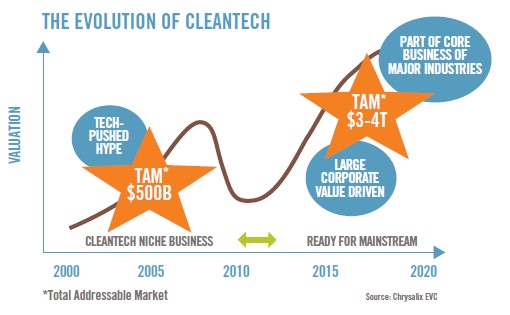At the Cleantech Venture Day on 28 October, the discussions focused on how – in the eyes of investors – cleantech companies who provide solutions for natural resource scarcity and the challenges posed by climate change can succeed. The participants referred to issues such as the uncertain nature of policy at international and national level, climate summits and new funding models for fast-growing companies. Half of the 29 companies pitching for investment were Finnish.
Cleantech has already become so mainstream that it no longer needs any introduction. In fact, cleantech solutions are already attracting market-based demand and funding. This is important to investors, since it signals that cleantech activities are no longer dependent on state support or the vacillations of industrial policy. In addition, a new global climate agreement is being sought on the measures needed to mitigate climate change. Everyone is agreed on one issue – climate policy needs to be more predictable.
But what, then, is the key to success in the cleantech markets? Being among the first to understand changes in the markets is a fundamental issue. This is true both for companies and investors. To understand such changes, you have to be aware of what your customers need and what your competitors are up to. In addition, it is just as important to try out your own solutions and their scalability in practice. Domestic markets play a key role in this respect.
Sitra is supporting the creation of a world-class cleantech reference area in Finland. This would provide Finnish companies with an excellent springboard and showcase for introducing their cleantech solutions to the world.
Major companies (the Fortune 500) claim that sustainability is already written into their strategies. This being the case, cleantech business will succeed and grow, even if the policy measures are weak. However, if the international community fails to put a price on carbon quickly enough, achieving market pull sufficient for the development of new solutions will remain a pipe dream. The World Bank’s Carbon Pricing Initiative and the adjustment of the emissions trading scheme have been well received by industry.
At the moment, fast-growing cleantech companies only have a few options when banks are reluctant to extend them credit because of an absence of sufficient guarantees. However, a new instrument is on its way which will complement the financial markets, enabling the rapid growth and development of cleantech firms until they achieve credit-worthiness in the eyes of the banks. The funding criteria for this new instrument are based on how well a client company meets certain objectives. In the event of a successful acquisition or listing on the stock exchange, the instrument provides the funder with an extra return on the investment. In practice, the instrument is based on high-risk loans with a swap option. We will watch closely to see whether the new fund achieves critical mass, and what kind of welcome it receives from companies and investors.
A new model for expediting industrial transition was also showcased at the Cleantech Venture Day. Developed under the working name of “Impact hedge fund”, this model will be tested over the next couple of years. See here for further details (in Finnish only).
View the presentations, pictures and videos from the event:
- dealflow presentations
- keynote presentations
- pictures
- videos of Wal van Lierop, Markku Ollikainen, Jennifer L. Wick and Jim Butcher.

Recommended